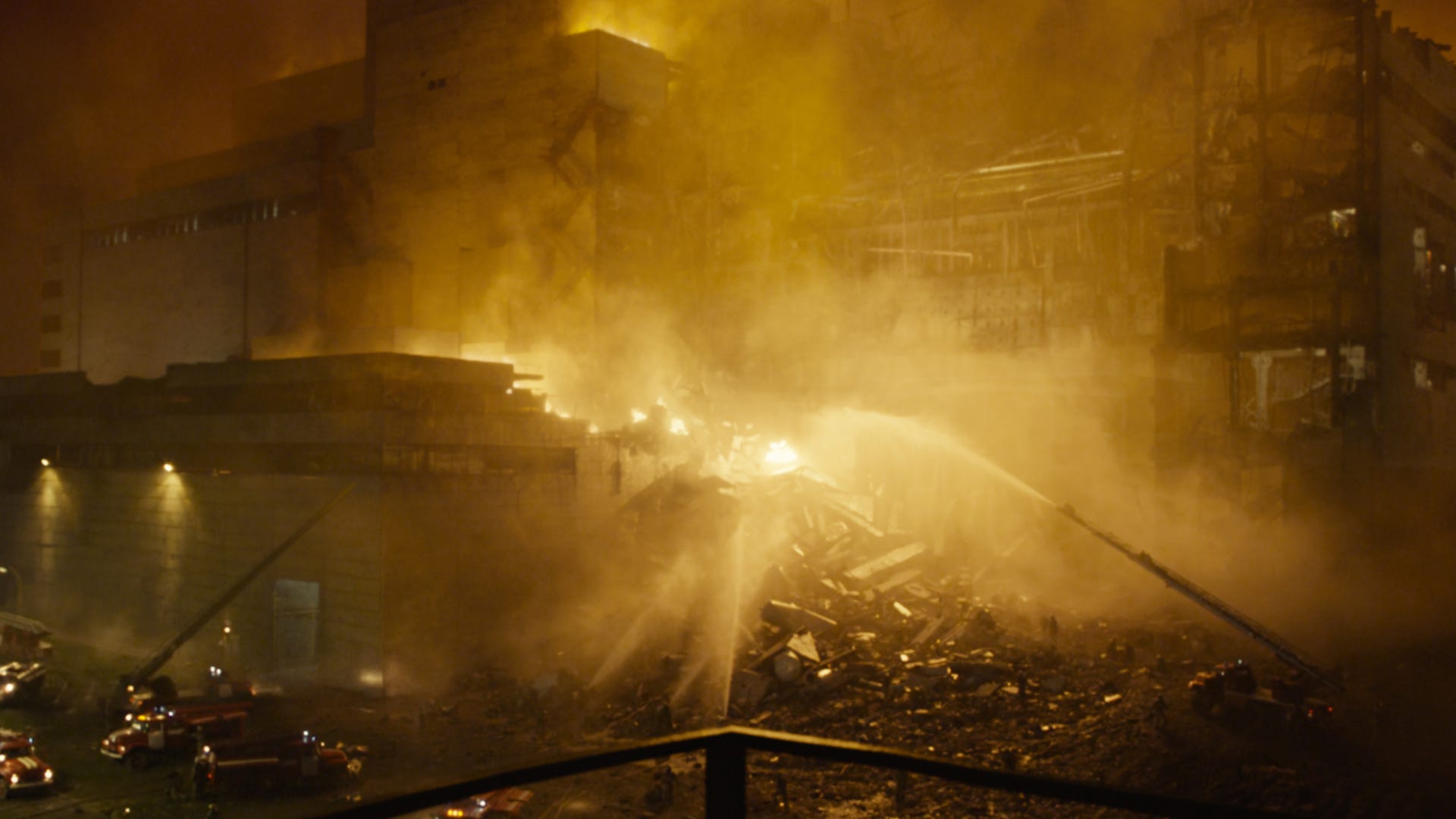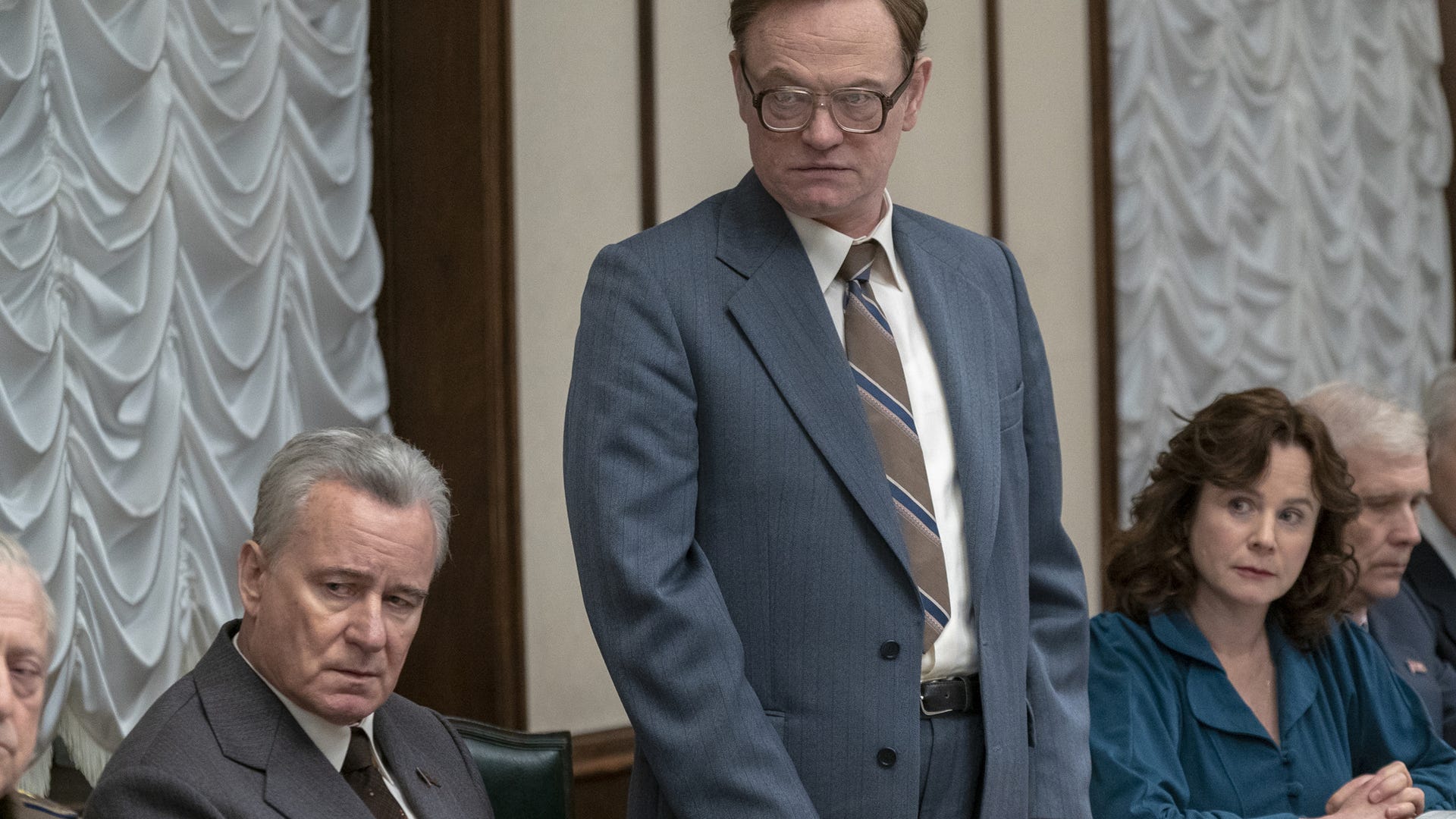Join or Sign In
Sign in to customize your TV listings
By joining TV Guide, you agree to our Terms of Use and acknowledge the data practices in our Privacy Policy.
Chernobyl Review: A Good Disaster Series About Slow Suffering and Bad Politics
HBO's miniseries functions as both a horror movie and a cautionary tale
At 1:23 a.m. Moscow time on April 26th, 1986, the unthinkable happened at the Chernobyl Nuclear Power Plant. It would be years before the world got a proper sense of what exactly occurred, and even now the scale of the accident's casualties remains in dispute. The official death toll, referring to deaths directly caused by the immediate effects of the accident, has held steady at 31. The unofficial death toll, taking into account factors like a spike in cancer rates in the region around Chernobyl, falls somewhere between 4,000 and 93,000, depending on who's doing the math. As for what what actually transpired, and who was to blame, the Soviet Union, by the most reliable accounts, spent its final years trying to spin the details and downplay unflattering elements, choosing to save face rather than release facts that could help prevent a similar catastrophe in the future.
HBO's five-part miniseries Chernobyl dramatizes the accident, its aftereffects, the Soviet Union's blurring of the facts and blackballing of those trying to release them, and the heroic efforts of those who stood up to threats ranging from radiation to bureaucratic inertia -- the latter potentially as deadly as the former. It's a lot to take on, but creator and writer Craig Mazin (previously best known for writing the Hangover sequels and having been Ted Cruz's college roommate) and director Jordan Renck create a sustained tone of dread that gives both the disaster and its aftermath the feel of a slow-rolling nightmare -- one made all the more chilling by the series' dedication to remaining grounded in facts.

Chernobyl
Liam Daniel/HBO
Chernobyl stars Jared Harris, Stellan Skarsgård, and Emily Watson, though its structure keeps them off-screen for most of the first episode. A grim, tone-setting prologue set two years after the accident introduces Valery Legasov (Harris), the scientist who led the government response to the accident, before Chernobyl flashes back to the accident itself, in which an already tense, late-night safety test becomes the site of chaos, confusion, destruction, and death. No one knows what's happening, and those in charge arrogantly refuse to accept facts or take any action that might prevent the matter from getting worse.
Discover your new favorite show: Watch This Now!
It's a chilling hour of television that alternates between a frantic recreation of the nuclear disaster and chilling details, like spectators watching from a nearby bridge, unaware they're signing their own death warrants by staring at the fire-engulfed reactor. Chernobyl's first episode plays alternately like a disaster film and a horror movie. It also foreshadows the events of subsequent episodes, when Legasov, joined by the gruff, initially reluctant government official Borys Shcherbina (Skarsgård) and fellow scientist Ulyana Khomyuk (Emily Watson, playing a composite character standing in for the response of the scientific community), have to battle shock, confusion, and misguided PR efforts to keep the disaster from worsening. And, based on the facts presented here, it could have been so much worse without the quick thinking and sacrifices of those who worked to contain a catastrophe that could have devastated a wide swathe of Eastern Europe if not kept in check.
For all the heroism Chernobyl depicts, however, it doesn't look away from the damage done by the disaster, both tangible and otherwise. The series portrays in grisly detail what it's like to die of radiation poisoning, and what it's like to watch as a loved one becomes barely recognizable as human because of exposure. One episode devotes a chunk of its running time to an effort to clear the affected area of irradiated animals, following a small squad as it moves from house to house killing pets that have been left behind and observing a newcomer forced to get over the shock of his grisly new duties, and the reality of what life in the area has become. Through it all, Mazin and Renck linger on carefully chosen details and memorable images, like a pile of radiation-tainted clothing stacked in the basement of a hospital or coal miners working in the nude, as their fathers did, as they labor in sweltering conditions and willingly risk their health for the greater good.

Stellan Skarsgård, Jared Harris, Emily Watson; Chernobyl
Liam Daniel/HBO
Skarsgård, Watson, and a sprawling supporting cast portraying everyone from Ukrainian first responders to Mikhail Gorbachev all turn in excellent work, but it's Harris who anchors the series. His anxious face doubles as a barometer for the gravity of the situation, when no response seems like it will come fast enough and one effort after another meets with disaster, from helicopters to lunar rovers. In one meeting with higher-ups, Skarsgård's Shcherbina describes the situation as "stable"; seated next to him, Harris works through a wordless flood of emotions, letting anger melt into fear then panic then back to anger again.
The performance also encapsulates Chernobyl's most impressive achievement: making a disaster that occurred long ago and far away seem present and real. The series details what took place before and after the reactor explosion but also the conditions that allowed it to happen, and which came close to making it even worse. As such, it doubles as a warning about who pays the cost when the hard facts of science butt up against political agendas, whether decades ago on the other side of the Iron Curtain or here and now. Some bad decisions have half-lives that last for centuries.
Chernobyl premieres Monday, May 6 on HBO.